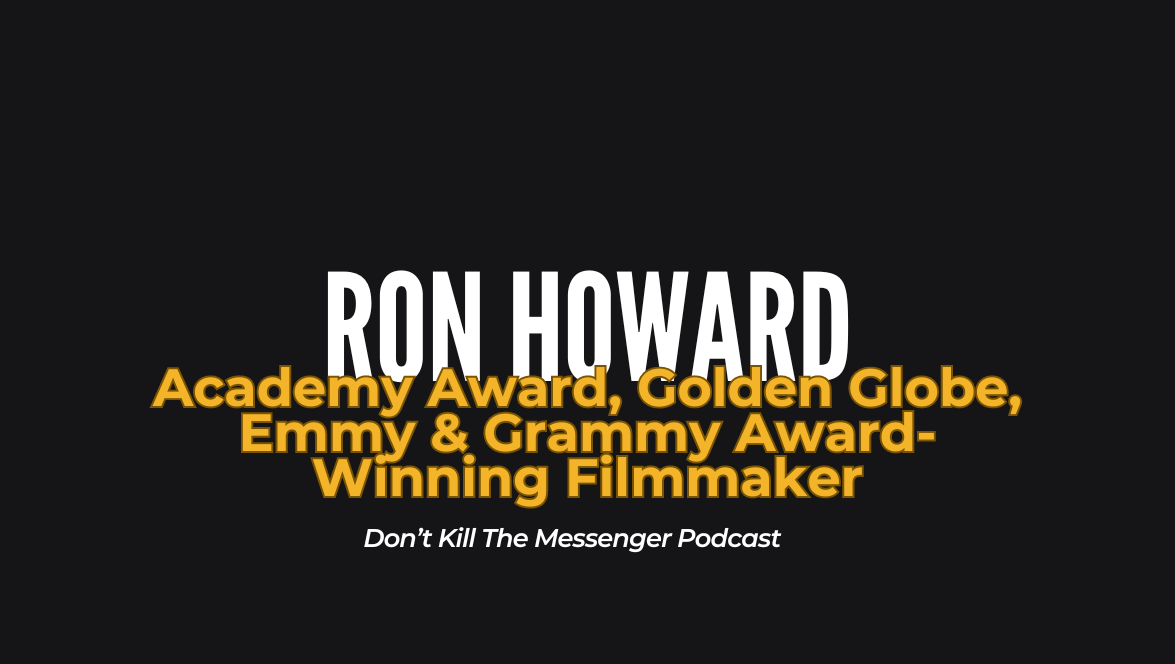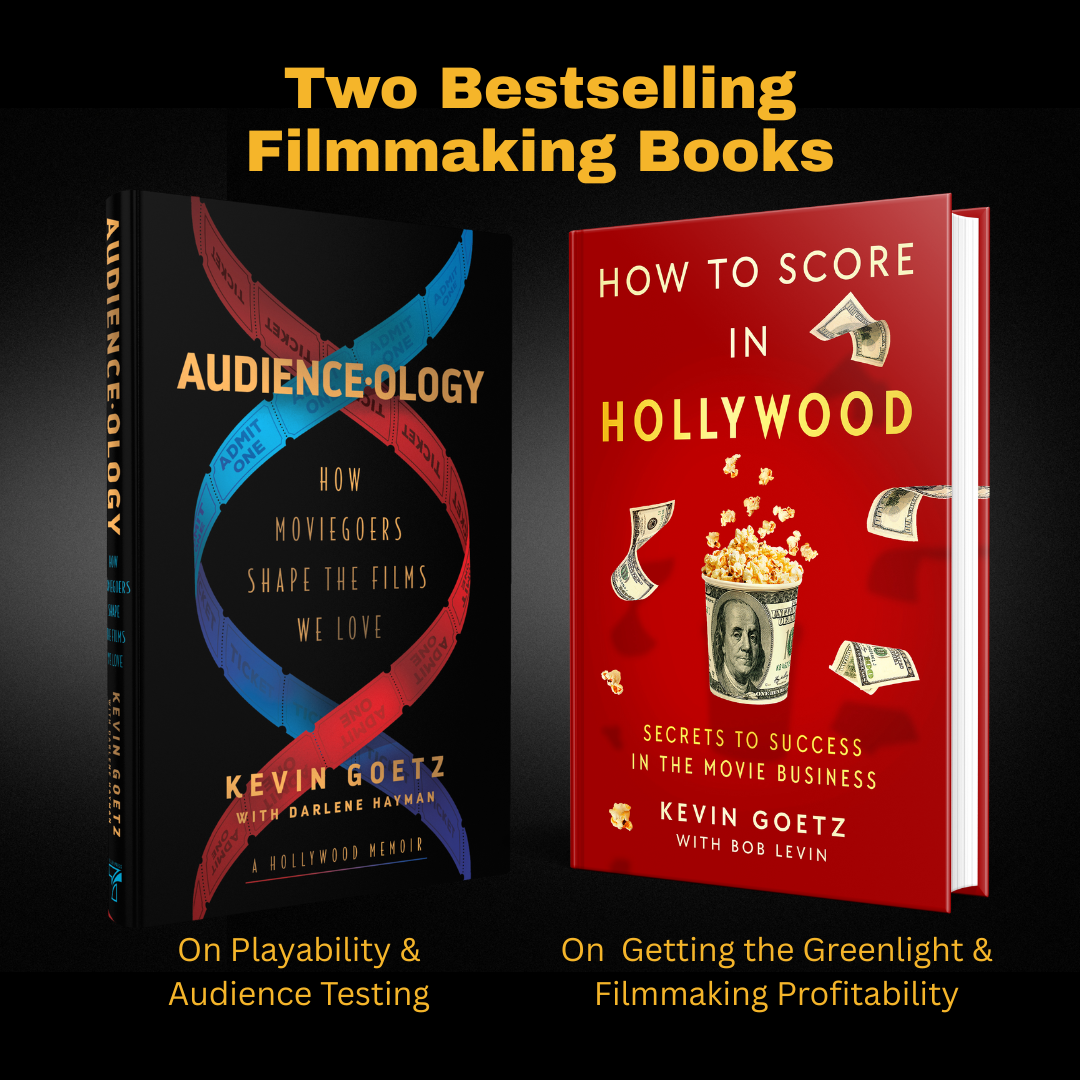
Don’t Kill the Messenger welcomes Oscar-winning director, producer, and actor, Ron Howard.
In this special 50th episode of Don’t Kill the Messenger, host Kevin Goetz interviews legendary actor and director Ron Howard. Ron Howard’s extraordinary career spans over six decades, starting as a child actor on The Andy Griffith Show and Happy Days before emerging as one of Hollywood’s most successful and versatile directors. His directorial achievements include critical and commercial successes such as Splash, Cocoon, Parenthood, Apollo 13, A Beautiful Mind (for which he won the Academy Award for Best Director), Rush, Thirteen Lives, and the upcoming Eden. In this intimate conversation, Howard discusses his remarkable journey, his philosophy on maintaining artistic vision while always respecting the audience’s point of view, and his experiences working with some of Hollywood’s biggest names.
Ron Howard on loyalty:
So to me, my loyalty first and foremost is to, what I hope is this intersection between my sensibilities, the project, and an audience. And that’s where your work comes in so significantly. But I don’t believe that I know what’s going to be a hit. I am not a brilliant marketing guy, that is more of a Michael Rosenberg, and Brian’s very gifted in that way as well. But the one thing I have control over is the storytelling and using those materials that I’ve been able to gather through the filming to try to land the plane, you know, to make sure that it reaches the audience. It’s a communication. It’s meant to achieve some connection with the audience. And once I’ve done that to the best of my ability, it works out better with some films than with others. But I can always move the needle toward that connection so that I feel that, well, if an audience member chooses to watch, there’s a really high percentage chance here that they’re going to enjoy it, that they’re going to appreciate it. They’re not going to feel like they wasted their time.
Early Career and Transition to Directing
Kevin and Ron begin the conversation by reflecting on Ron Howard’s start as a child actor on “The Andy Griffith Show” and how that experience shaped his approach to filmmaking. He discusses the collaborative environment and problem-solving attitude he encountered, which he’s carried forward into his directing career.
Ron Howard on The Andy Griffith Show:
“Even in the TV shows that I did, especially the Andy Griffith Show, that was the spirit of that environment around that show. It was collaborative. There was discussion, there was problem solving. Sure there was hierarchy, but it was very serious in terms of wanting a great outcome and recognizing that we were a part of a hit show that meant a lot to audiences.”
Working with Bette Davis as a Young Director
One of the most memorable experiences in Howard’s early directing career was working with the legendary Bette Davis. At just 25 years old, Howard found himself directing Davis in a television movie. He recounts the initial tension, with Davis insisting on calling him “Mr. Howard” until she decided whether she liked him or not.
Howard recounts a memorable experience with Bette Davis:
At a certain point, late in the day, she was having trouble with this one exit, the timing wasn’t right. And I suggested that she leave, I don’t know, either earlier or later, and hesitate before she got to the door and turn around and, and go or something. And she says, oh no, that won’t work. I, that’s, no, that’s not, I, I, no, that’s, that’s a bad idea. And I said, well, would you just try it for me? And she said, well, certainly I’ll try it because you know, I’ve always been the director’s kid. I’ll try anything. So we tried it. We got through the rehearsal, and she did the move, changed the timing, and immediately turned around and said, you’re right. That works better. Okay, let’s shoot it. We shot it. She did it that way. It went well. We finished out the day. When it was over. I said, well, Ms. Davis, you’re wrapped great first day, thanks, I’ll see you tomorrow. And she said, okay, Ron, see you tomorrow. And she patted me on the ass.
Ron’s Approach to Filmmaking
The director explains his filmmaking philosophy as rooted in collaboration and creating an environment where creativity can flourish. He emphasizes the importance of understanding the story deeply and communicating it effectively. Howard discusses how he strives to provide opportunities for actors to excel:
I really do respect the people I’m working with and try to create an environment where they can excel. Also, I really love understanding story. I’m really interested in what stories have to say, what they can offer to an audience, what kind of performance opportunities that might give actors, where there are places to let the special effects or the music or the cinematography really shine.
Notable Films and Career Highlights
Throughout his career, Howard has directed a wide range of critically acclaimed and commercially successful films. When asked about his favorite projects, he points to works from different stages of his career that he feels particularly proud of. When asked about his favorite projects, Howard shared:
I think Apollo 13 and Parenthood are probably two of my favorites from that mid-thirties, early forties, what is really, really hitting my stride when I was feeling confident and I had support of the studio and the industry, and those are in their own way movies I’m really proud of and very personal. And then in recent years, I would put Thirteen Lives in. I’m really proud of that movie.
Winning the Oscar for A Beautiful Mind
Howard vividly recalls the night he won his Oscar:
This is a kind of wild, Kevin, because there was a number of things that went on. First it was a relief because people sort of expected me to get it, but it had been expected that I would be a candidate for Apollo 13, and I wasn’t nominated.
He also shared an insider story about Mel Gibson presenting the award:
So I went up, I did remember my speech, more or less. I did that. And on the way out, I said to Mel, show me that fricking card. I might not have said frick. And he showed it to me, and thank God it had my name on it. So, oh man, it was a good, it was a good moment.
Balancing Art and Audience
One of Howard’s strengths as a director is his ability to create films that are both artistic and audience-pleasing. He explains his perspective on this balance, emphasizing the importance of understanding and respecting the audience while maintaining artistic integrity. He explains:
Well, it is a dance, and it must be undertaken with real thought and consciousness. Because the audience, of course, they know what they like and they know what they don’t like. They don’t necessarily know why. It begins with art. It begins with a desire to communicate something. Whatever the tone, whether it’s silliness and fun, look, everything carries a theme with it and a set of ideas, or it won’t even register with an audience.
Howard emphasizes the importance of understanding audience feedback:
When you start sharing it with an audience, the challenge is to understand what the questions are and what the answers could be and how they could help you. The question is, what do you think? Look, it’s a little bit like if you tell a joke at a party and you don’t tell it very well, it doesn’t get much of a laugh, but you know there’s something funny there. Maybe the next time you tell it better and it does get a laugh. So the spirit of the joke, the idea of the joke remains the same, but the delivery improved. So this is really about understanding how the ideas are being delivered and what it’s adding up to. And when you get the answers back, it’s sometimes it’s pretty heartbreaking to you as a creative person. But if you understand the information, the feedback that you’re getting, you then get to make a value judgment. You get to make a decision.
Ron Howard’s career is a testament to his enduring talent, adaptability, and passion for storytelling. From his early days as Opie on The Andy Griffith Show to winning an Oscar for A Beautiful Mind, Howard has consistently delivered compelling narratives across a wide variety of genres. His ability to balance artistic vision with audience expectations has resulted in an acclaimed body of work that resonates with both critics and viewers. Ron Howard remains a well-loved and innovative figure in Hollywood, always seeking to push the boundaries of filmmaking while maintaining a deep respect for the audience.
For the full conversation, check out the podcast episode here. And let us know your thoughts on the episode in the comments!
Don’t Kill the Messenger, hosted by movie and entertainment research expert Kevin Goetz, brings his book Audienceology to life. This bi-monthly podcast takes a peek behind the filmmaking curtain as Kevin talks with famous filmmakers, studio executives, stars, a
For more information about Ron Howard:
Wikipedia: https://en.wikipedia.org/wiki/Ron_Howard
X (Formerly Twitter): https://twitter.com/RealRonHoward
IMDB: https://www.imdb.com/name/nm0000165/
For more information about Kevin Goetz:
Website: www.KevinGoetz360.com
Audienceology Book: https://www.simonandschuster.com/books/Audience-ology/Kevin-Goetz/9781982186678
Facebook, Twitter, Instagram: @KevinGoetz360
Linked In @Kevin Goetz
Screen Engine/ASI Website: www.ScreenEngineASI.com






